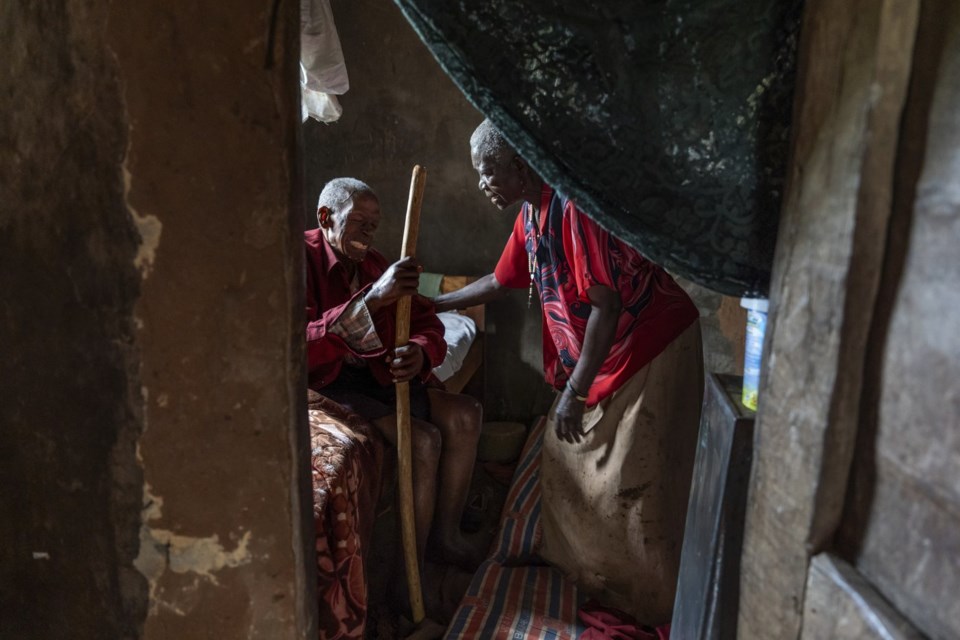MUKONO, Uganda (AP) — Maybe it’s something as simple as a urinary tract infection that has 80-year-old Erisafan Khayiki doubled over in pain. Or a kidney stone. Or something more.
The only thing certain is a truth that repeats across this continent: For a poor man like him, there are few options. And so this will be the day that he dies.
As more and more Africans reach old age, economic realities are often clashing with the needs of late life. When a medical bill is too much to face or even a ride to the doctor is out of reach, a patient can begin a spiral toward a painful death.
“For so long, Africa’s population has been youthful. Over the years, medical care has improved for them. But for the old it has not,” says Dr. Lenusia Ahlijah, who is one of Ghana’s few geriatricians. “There are no trained people who understand any of the special health problems of the elderly. We have to find a solution.”
A lifetime of poverty can bring unique challenges in old age.
Some who, for years, passed up doctors when they were sick, relying on cheap, over-the-counter antibiotics, experience drug resistance. Others who have gone without treatment for hypertension end up with vision loss or vascular dementia. Untreated injuries are, in part, to blame for one in five older Ugandans having a severe disability.
Even using the bathroom is intertwined with an older person’s wealth. Forced to squat over a latrine and no longer able to support themselves, some touch the ground, and with water precious, they pass up handwashing and contract typhoid.
“Omwavu wakufa,” goes a phrase in Luganda, one of Uganda’s native tongues, an expression that gained popularity as COVID raged. “The poor man will die.”
Across much of Africa, older people fall into a blind spot of public health systems that prioritize infectious diseases, maternal care and children. Trained geriatricians are rare, national health care programs are limited, and clinics are rarely equipped to manage chronic conditions tied to aging. Many older people have little access to doctors and, if they see one, often forego necessary diagnostics or treatment to cut the costs.
“I will not check for this,” Mugerwa says they’ll say, “I will not check for that.”
Eventually, it comes to a head.
Khayiki is sitting on his bed when a nurse ducks to enter the doorway of his tiny room. He is wincing as he clenches a thick walking stick that rests against his temple.
“I’m in pain,” he says softly.
It is beyond the nurse’s capacity to diagnose, though. He tells Khayiki he isn’t sure what is wrong and that he will have to go see a doctor at the clinic.
“There’s nothing I can do here,” the nurse says.
They agree a ride should be arranged for him to see a doctor, but act with no urgency.
As night falls, Khayiki cries out in pain. He wonders aloud if he can survive. He stirs and talks and frets so much that his wife, Maria Kimono, goes to sleep in the other room.
By morning, he is dead.
If Kimono had known this would be her husband’s last day, she wouldn’t have chastised him for not listening and wouldn’t have left him alone when his moans grew loud. She hopes he was proud of how she took care of him as he ailed, how she’d struggle to carry him outside when he asked, how she’d been faithful to him to his last day.
He had spent years working as a pump attendant at a Kampala gas station, sending back money to care for his family. In old age, even with his sight gone, he showed up to church gatherings and could be seen singing and, on occasion, dancing.
He was buried in the yard, just beyond the clothesline, near a grandchild who went before. An Anglican minister came and said prayers and friends gathered and bowed their heads.
Maybe things would have been different, Kimono says, if her husband wasn’t so poor.
___
Matt Sedensky can be reached at [email protected] and https://x.com/sedensky
Matt Sedensky, The Associated Press



